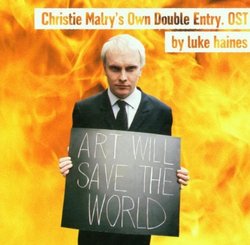A tantalizing taste/preview of tender pop contempt
C. McQuain | Seattle, WA USA | 10/11/2001
(3 out of 5 stars)
"Now that Morrissey, Brett Anderson, and Jarvis Cocker are either semi-retired, on sabbatical, or in decline (depending on who you ask), one shining, incisive star stands to save British pop from its latter-day meandering vagueness. That savior's name is Luke Haines.
With an already extremely large and almost as extremely distinguished body of work behind him- including four albums as ringleader of The Auteurs, two as headmaster of Black Box Recorder, and one as Baader Meinhof- Mr. Haines now releases his first self-confessed "solo" record, the soundtrack to Paul Tickell's film of B.S. Jones's cult novel, Christie Malry's Own Double Entry. Let's point out right up front that half of the album is instrumental "score" intended to be accompanied visually by the film; though the pretty but sinister melodies are identifiably Haines's, these pieces lack the full stamp of Haines, as much of the thrust and bite of his work comes with his incomparably clever, literate, sad and funny lyrics and vocal melodies.
Which leaves us with a total of six pop songs of the sort we've come to expect from Haines: "Discomania," a rocker (containing the rather memorable lyric "Kim Wilde is Sex") that wouldn't have been out of place on The Auteurs's 1999 album How I Learned to Love the Bootboys. A different version of "Discomania" will appear on Haines's solo album proper, The Oliver Twist Manifesto, to be released on 2 July. The most musically audacious and experimental track on the album, "In the Bleak Midwinter" uses a choral arrangement as musical accompaniment for Haines's counter-melody (which contains the snidely crooned, ironic lyric "art will save the world"); the two elements add up to a gorgeous, original, and slightly disturbing ballad. It's followed immediately by another ballad, "How to Hate the Working Classes," a treatise on the embittering aftermath of political disaffection and lost love. "Discomaniax" is an alternately churning and orchestral, fatalistic update of T. Rex's "Children of the Revolution." "England, Scotland and Wales," a midtempo number with a very Black Box Recorder arrangement, finds Haines at war with Winston Churchill and George Orwell. The only thing that comes close to a disappointment is a cover of Nick Lowe's "I Love the Sound of Breaking Glass;" it may be perfectly fitting for the film (which I've not yet seen), but the doomy repetitiveness is far too reminiscent of run of the mill industrial music and seems doubly pedestrian coming from Haines.
Christie Malry's Own Double Entry offers only a tantalizing, far too brief taste of the tender contempt sure to be in full bloom on Haines's upcoming "official" album, The Oliver Twist Manifesto. Still, though you're paying full price for what amounts to an EP's worth of Haines, every completist will have to have it, and in this writer's experience, to be fan of this vital pop genius is synonymous with completism."


 Track Listings (12) - Disc #1
Track Listings (12) - Disc #1